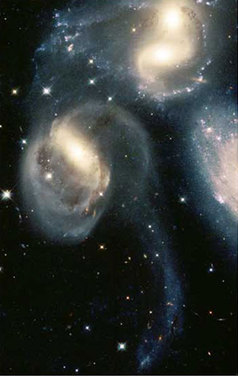Our Galaxy
...and Grows
There's another way that galaxies grow: they eat other galaxies.
Our Milky Way is no exception. In fact, right now, it is devouring at least two smaller galaxies—a gentler way to put it might be that it's merging with them—and becoming one larger whole.
Big galaxies collide, too, but it takes many millions of years for the mix to settle into an organized form. As we look around with large telescopes, we see snapshots of these works-in-progress.
And someday—about five billion years from now—our Milky Way will collide with and join its larger neighbor, the Andromeda galaxy. Together they will likely form a giant elliptical galaxy, a huge puffball of stars in the darkening universe.
